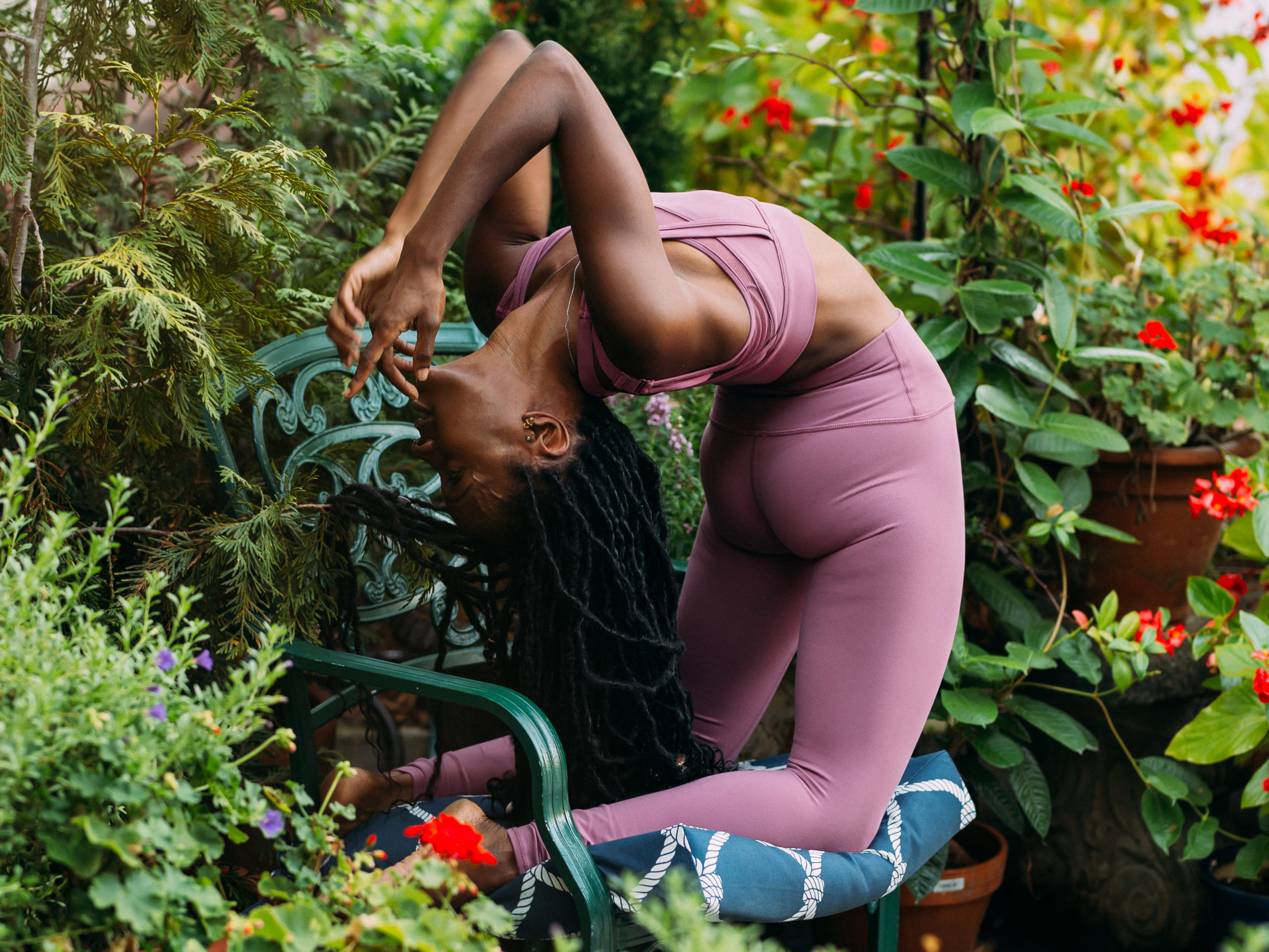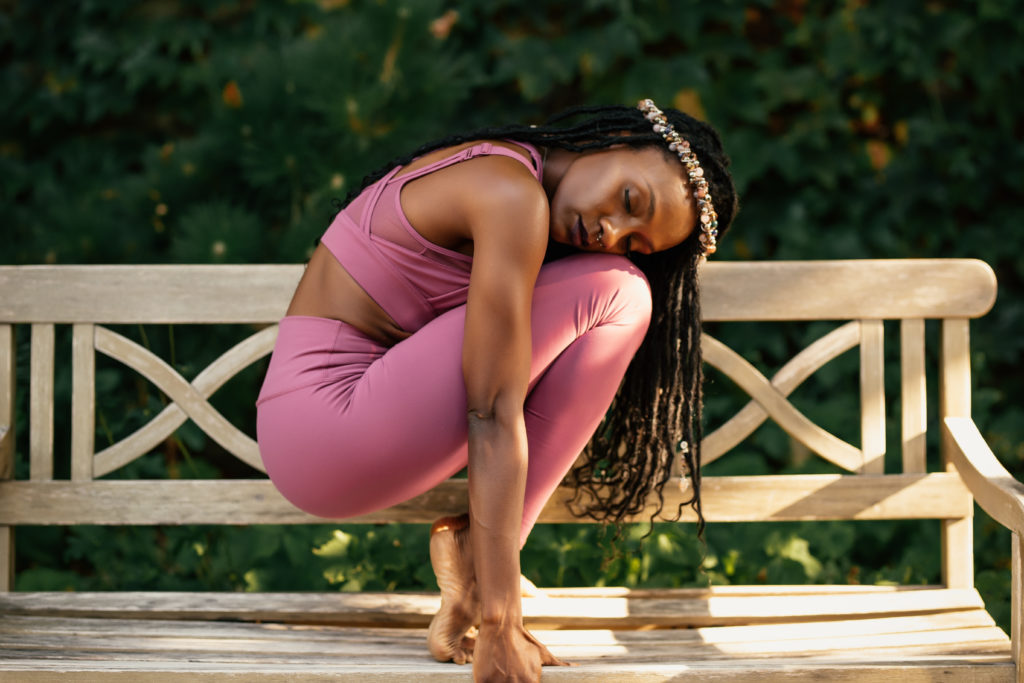When I first began practicing yoga in 2013, I was solely drawn to the physicality of the practice. I wanted to learn how to do all the cool poses I’d come across on Instagram. So much of my 3 hour practices consisted of wrestling with my ego to master difficult asanas, or poses. This dance went on for quite some time, but as I spent more and more time on my yoga mat, something else started to shift within me.
I noticed the lessons I was learning as a result of consistent practice started to have a domino effect in the way I showed up for challenges arising in my daily life.
There’s a reason that yoga isn’t considered just a regular exercise, like going to the gym or an aerobics class. Yes, yoga has a physical aspect to it. You learn beneficial poses that help with flexibility, strength, stability, balance, and more. But not only are these benefits for your body, they can be translated to non-physical benefits, too; ones that exist off the mat. A commitment to a yoga practice is a commitment to a lifestyle; we get the opportunity to learn skills and practice these skills on the yoga mat then apply them to our everyday lives.
Here are 8 ways to apply your yoga practice lessons into your daily life.
1. It expands our overall flexibility, releasing rigidity and resistance to change.
You may decide to start a yoga practice because you have tight hamstrings or a stiff back, and with a steady practice, you’ll begin to experience relief and release in these areas. You may even accomplish learning to do a Split or King Pigeon Pose along the way…heyyyy!
But also consider this… while you’re working on mastering splits, imagine what inviting in more flexibility off the mat would look like in your life. If you tend to be rigid in your thinking, for example, practice opening your heart and mind in your daily routines. Keeping an open mind could look like trying new things, stepping out of your comfort zone, exploring new perspectives, and even being ok when things don’t work out the way you originally planned.
With consistency and patience in this practice, you could begin to notice yourself being a lot more calm and tolerant in situations that would’ve caused stress or anxiety before.
2. It increases your awareness, ability, and desire to pay closer attention/listen to yourself and others.
How many of us have a tendency to listen to respond, rather than to understand? In order to comprehend another person’s point of view, you have to take the time to actively listen. Practicing yoga, you begin to increase your listening skills. In classes, you have to pay close attention to the teacher providing instructions so you can move in and out of yoga poses fluidly and safely. This also means paying attention to your own body. As instructions are given, your body has to respond to achieve the intended goal. When you stop listening, there is the risk of missing important cues or even making a mistake that might cause harm.
Try applying this skill off the mat. When you’re in conversation with someone, for example, be present and truly listen to what they have to say. Engage in conversation rather than dominate it. This will improve the health of your relationships, too, because you begin to truly listen and can have open and honest conversations with your friends, family, colleagues, and partners.
3. You become less judgemental and more compassionate.
Another beautiful result of open and honest communication is offering a safe space with no judgement. This will encourage others to be more free and expressive with you when there is no judgement attached to your conversations. Interactions will tend to be more honest and open. You can practice this skill in yoga, too. Although not the most obvious of benefits, like gaining more flexibility in your hamstrings, learning to be non-judgmental is a part of the practice. While in class, you are encouraged to become the internal witness; to observe what is happening inside of you – your thoughts, your emotions. And as you become aware of these sensations, you learn to be more accepting rather than judging.

You begin to see things as they are, rather than attaching a judgment to it. If you’re able to do that for yourself, you can even do it off the mat while engaged with others. It allows for outside truths and perspectives to not only be expressed freely, but invited in from others.
4. You will become much less reactive.
When you are able to experience your internal non-judgmental witness, you’ll find that you’re less reactive to situations. In yoga, if you fall out of a balancing pose, for example, rather than getting upset, you accept the experience and step back into the pose. As a result, you feel less anxious; your stress response significantly decreases. This, too, can be practiced off the mat. The little things that used to upset you will seem unimportant after practicing yoga for a while. You’ll be able to move forward without letting certain situations plague your mind causing you more stress. As a result, you’ll feel happier, more content with life’s events, even when there’s mishaps and mistakes; you’ll learn to not react to them too strongly.
5. You will slow down, and become more connected with the present moment.
I feel safe in saying, most of us lead very busy lives; we are always on the go! It’s a rare opportunity that we take the time to truly slow down to take care of ourselves. In yoga, we’re often reminded to take a slower pace. It is the time in which you slow down your body and to ease your racing mind. This practice can certainly be taken off the mat. When you find yourself rushing around town, with a mind filled with frazzled thoughts, remember what you learned in your yoga practice. Take a few seconds to stop, take a few deep breaths, acknowledge the present moment, and then proceed with your obligations.
I have a common daily practice to take conscious breath breaks through the day. These moments of re-centering last anywhere from 1-15 min depending on my day. This practice has been especially helpful as a way to reset my energy as I move around throughout the day from one place to the next. I share more about ways to

6. Your patience will drastically increase.
In addition to slowing down, yoga helps you to become more patient. In addition to the fast-paced lives we lead, we often want things immediately. We have lost the sense of patience since we are in the era of the internet, cell phones, and drive-throughs. Having a regular yoga practice invites us to not only slow down, but it teaches us to wait; to not anticipate things so quickly. Practicing yoga reminds you that it takes time, effort, commitment, and dedication to achieve some goals. This is something that you can certainly use outside the yoga studio walls. If you have some life plans or goals, remember that achieving those goals doesn’t happen overnight; it requires patience and ease of mind in order to take the steps toward your intended goals.
7. You’re challenged to push past your comfort zone.
As you practice yoga consistently, you will build a great deal of strength and perseverance, especially if you’re practicing something like Power Yoga. You will engage in postures that are intense for the body that, over time, make you strong. When mastering such poses, you will be challenged to push past your current comfort zone. This can translate physically in the body, mentally, and in how you navigate in business, and personal life.
Having a strong mind go hand-in-hand with slowing down and having patience. It provides a sense of confidence that allows you to pursue your goals even when it may take a significant amount of time.
8. You will start to increase your focus and concentration.
Another amazing benefit of your yoga practice that you can take off the mat is focus and concentration. When you take the time and really devote yourself to your practice, you experience a softening of the mind. You’ll feel less tense, less reactive, more calm, and more in-tuned. Our minds can easily wander, especially when there is so much to manage in our lives. Yoga gives you the gift of slowing down to focus and to better concentrate. You’ll see this in your everyday life, too. You’ll be able to focus on your work easier. Distractions will become minimal. You’ll be able to concentrate on what you need to get done. More items will be checked off your to-do list. This ultimately, begins to make you feel lighter and happier as you reap the benefits of a more intentional life.
These are just a few of the many ways a consistent yoga practice continues to inspire my life on and off the mat. I’m always talking about this with my Instagram community, join me. It’s an exciting feeling to know that the journey and the lessons learned are never-ending. I’d love to hear below about the ways you’ve experienced yoga off the mat? Help us stay inspired by sharing below.

COMMENT